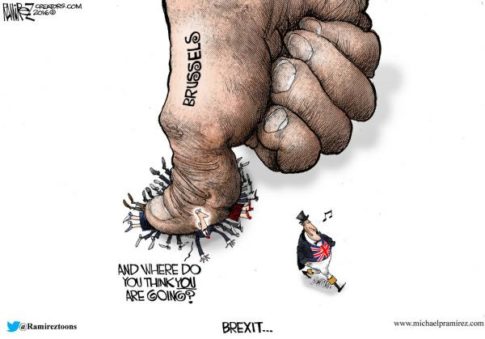– Ignore the prophets of doom. Brexit will be good for Britain:
Now, with blood barely dry on their lips, project fear has mutated into project stupid-idiots. I find it staggering that the remain minority can accuse the Brexit majority of not knowing truth from lies – unlike in all elections? – and could not have meant its vote. It should therefore be asked to vote a second time, and show due respect to its elders and betters. What planet are these people on? I would guess the leavers in a second vote would soar to 60%, out of sheer fury.
Brexit is starting to deliver. British politics was constipated and has now overdosed on laxative. It is experiencing a great evacuation. It has got rid of a prime minister and is about to get rid of a leader of the opposition. It will soon be rid of a chancellor of the exchequer and a lord chancellor. It is also rid of two, if not four, Tory heirs apparent. Across the spectrum the left is on the brink of upheaval and perhaps historic realignment, if only the Liberal Democrats have the guts to engineer it. The Greens and Ukip have both lost their leaders. An entire political class is on the way out. As Oscar Wilde said of the death of Little Nell, it would take a heart of stone not to laugh.
During the referendum I was persuaded neither by project fear nor by Brexit’s projected sunny uplands. I thought, and still think, time and compromise will eventually stabilise Britain’s relations with the EU as not so different from today. Whether the stabiliser is joining the European Economic Area (within the letter, if not the spirit, of Brexit) or some other arrangement – who knows? I voted remain because I felt Europe’s future to be so precarious as desperately to need Britain’s more forceful presence. I feel that more strongly after the news that the European parliament leader, Martin Schulz, wants to move the EU swiftly to a “one government” federal constitution.
Meanwhile, as the air clears, Cameron’s government suddenly seems old and tired, stuck in a morass of failing policies, special interests and vanity projects. Reforms to health, housing and welfare are defunct. Schools and universities are slithering into blind targetry. Planning is riddled with corruption. No one dares challenge the chancellor on his high-speed trains, nuclear power stations and London runways. For all the talk of a widening gulf between rich and poor, the favour shown to banks and foreign money is astonishing.
The referendum has shone an overdue spotlight on the divide between London and the provinces, between country and town, and between the more and the less educated. While I reject the liberal consensus, that Brexiters are working-class racists too stupid to know a tax from a tariff, the social division revealed by the vote was glaring. It is also ingrained. Boris Johnson rightly derided the London media for behaving as if mourning a “national” disaster. No one reported the celebrations and street parties that greeted Brexit up north. Never were two Englands more apart.
Now we have the backtracking on project fear. Of course there is uncertainty and an initial lack of confidence. It would be amazing if the pound did not “take a knock” this week or if bank shares and house prices did not plummet, poor things. Remain’s ludicrous prophecies of doom cannot have helped, any more than can Whitehall’s failure to prepare for a Brexit outcome. Will there be a Chilcot report into the lack of contingency planning?
It appears that, after all, there is to be no emergency Brexit budget, no tax rise, no enhanced austerity. Indeed, the Treasury, for which the referendum has been an all-time low, promises not higher income tax, but lower corporation tax. The Bank of England will pump more money into the economy, or at least into the banks. There will be lower interest rates and a relaxation in reserve ratios. The speculative fever that has fuelled the London property bubble will end. The capital’s demented skyline is already ruined, but may win some respite. It will stand as an enduring monument to the Cameron-Johnson era: one of ugly, uncontrolled greed.
I cannot see that as bad news. George Osborne’s patchy attempt to rebalance the geography of growth has far to go. But a stark referendum lesson is that those who live by centralising power and wealth in the capital can easily die by it. London is big enough and rich enough to prosper in some new relationship with the EU – witness this week’s merger of the London and Frankfurt stock exchanges. But a bit of post-traumatic stress disorder on London’s part is good. So too would be some indication from the Tory candidates of how they intend seriously to devolve wealth from Kensington to Consett.
All governments, democratic as well as authoritarian, tend in time towards the Augean stables. They need regular cleaning out. But the cleaning is rarely at moments of their choosing, and the effort can be Herculean. Britain suffered in the fuel crisis of 1973, in the austerity of 1979-81, and in the miners’ strike of 1984-85. All were painful, as now will be Brexit. But all were salutary.
Disruption may be a fad of hipster economics. But as Chesterton’s Napoleon of Notting Hill reflected in the heat of battle, there is nothing like being hit over the head “with six feet of pole with six pounds of steel” to cause you to “re-examine philosophies and religions”.
Social democracy and capitalism both need hitting over the head from time to time. It detoxifies them of bureaucracy, monopoly and cronyism. Britain is experiencing such a time. It should do us no end of good.

Hmmm
http://www.telegraph.co.uk/news/2016/07/08/theresa-may-britain-faces-tough-times-but-can-enjoy-a-better-bri/
Hmmm again
http://www.theguardian.com/politics/2016/jun/30/brexit-disaster-decades-in-the-making
Hmmm again
http://www.intrepidreport.com/archives/18408
What immigration crisis?
https://www.mail.com/int/entertainment/lifestyle/4466274-peterborough-brexit-migrants-english-pub-left.html#.1272-stage-hero1-7